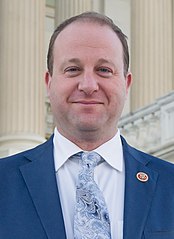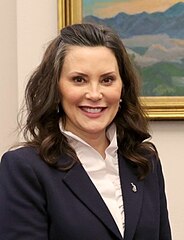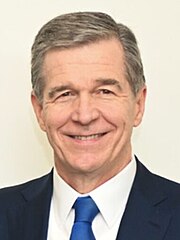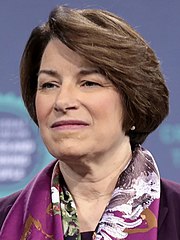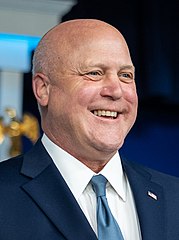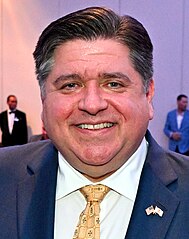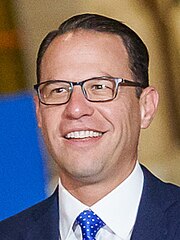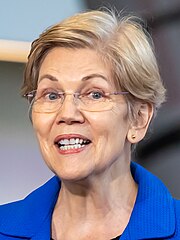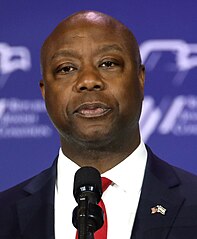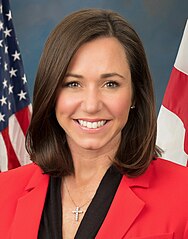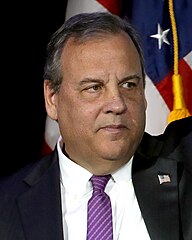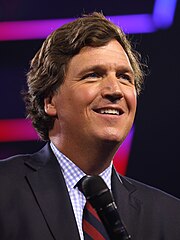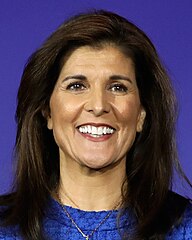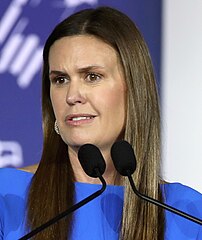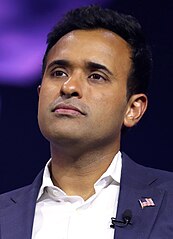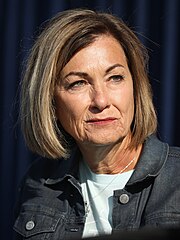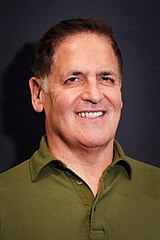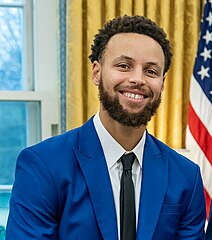2028 United States presidential election
| |||
538 members of the Electoral College 270 electoral votes needed to win | |||
|---|---|---|---|
|
| |||
 2028 electoral map, based on the results of the 2020 census | |||
| |||
The 2028 United States presidential election will be the 61st quadrennial presidential election, set to be held on Tuesday, November 7, 2028.[1] Voters in each state and the District of Columbia will choose electors to the Electoral College, who will then elect a president and vice president for a term of four years.
The winners of this election (and the new president-elect and vice president-elect after it) are set to be inaugurated on January 20, 2029. President-elect Donald Trump, who won the previous election, will be ineligible to pursue a third term in 2028 due to the two-term limit established by the Twenty-second Amendment to the U.S. Constitution.
Background
Procedure
Article Two of the United States Constitution states that for a person to serve as president, the individual must be a natural-born citizen of the United States, be at least 35 years old, and have been a United States resident for at least 14 years. The Twenty-second Amendment forbids any person from being elected president more than twice. Major party candidates seek the nomination through a series of primary elections that select the delegates who choose the candidate at the party's national convention. The national convention chooses a vice presidential running mate to form that party's ticket. The nominee for president usually picks the running mate, who is then ratified by the delegates at the party's convention.
The general election in November is an indirect election, in which voters cast ballots for a slate of members of the Electoral College; these electors then directly elect the president and vice president.
Electoral map
Electoral partisanship
Approximate partisan lean of the 50 U.S. states and the District of Columbia on the presidential level. The shading of each state denotes the winner's two-party vote share, averaged between the 2016 and 2020 presidential elections. States that flipped in 2020 are colored grey. In recent presidential elections, most states are not competitive, since their demographics keep them solidly behind one party. Because of the nature of the Electoral College, this means that swing states—states that are typically very competitive and "swing" between the Democratic and Republican parties—are vital to winning the presidency. These include states in the Midwestern United States, such as Wisconsin, Michigan, and Pennsylvania, and states in the Sun Belt, such as Nevada, Arizona, Georgia and North Carolina[2]. Due to gradual demographic shifts, some swing states such as Iowa, Ohio, and Florida have shifted significantly towards Republicans, favoring them in statewide and local elections. Meanwhile, states like Colorado, Minnesota and Virginia have moved noticeably towards Democrats, and they have become the dominant political force there.
The traditional Democratic electoral coalition, securing the "blue states" for Democratic presidential candidates, is mainly composed of minority groups (especially African-Americans and Latinos), women, educated professionals, and urban voters. Working class voters were also a mainstay of the Democratic coalition since the days of the New Deal, but since the 1970s, many have defected to Republicans as the Democratic Party became significantly more educated, diverse, and culturally liberal. Conversely, the traditional Republican coalition that dominates many "red states" is mainly composed of rural white voters, evangelicals, the elderly, and non-college educated voters. Republicans have also historically performed well with suburban, middle class voters since the 1950s, but this bloc has drifted away from them in recent years due to the rise of the Tea Party movement and later the Make America Great Again movement, a brand of right-wing populism cultivated by former President Donald Trump. The acceleration of this trend has been credited with tipping the 2020 presidential election in favor of Democrat Joe Biden, since the incumbent Trump was historically unpopular in the suburbs for a Republican candidate, underperforming there significantly.
Candidates
Democratic Party
Publicly expressed interest
- Jared Polis, 43rd Governor of Colorado (2019–present), U.S. Representative from Colorado's 2nd congressional district (2009–2019), member of the Colorado State Board of Education from the at-large district[3][4]
- Gretchen Whitmer, 49th Governor of Michigan (2019–present), Ingham County Prosecuting Attorney (2016), Minority Leader of the Michigan Senate (2011–2015) from the 23rd district (2006–2015), member of the Michigan House of Representatives from the 69th district (2001–2006)[5]
Potential candidates
- Joe Biden, 46th
[[President of the United States (2021-present), 47th Vice President of the United States (2009-2017)
- Andy Beshear, 63rd Governor of Kentucky (2019–present), 50th Attorney General of Kentucky (2016–2019)[6][7]
- Cory Booker, United States Senator from New Jersey (2013–present), 38th Mayor of Newark, New Jersey (2006–2013), candidate for president in 2020[8]
- Jamaal Bowman, United States Representative from New York's 16th congressional district[8]
- Pete Buttigieg, 19th United States Secretary of Transportation (2021–present), 32nd Mayor of South Bend (2012–2020), candidate for president in 2020[7][9]
- Roy Cooper, 75th Governor of North Carolina (2017–present), 49th Attorney General of North Carolina (2001–2017), North Carolina State Senator (1991–2001), North Carolina State Representative (1987–1991)[7]
- John Fetterman, U.S. Senator from Pennsylvania (2023–present), 34th Lieutenant Governor of Pennsylvania (2019–2023), Mayor of Braddock, Pennsylvania (2006–2019)[7]
- Ruben Gallego, U.S. Representative from Arizona (2015–present)[10]
- Kamala Harris, 49th Vice President of the United States (2021–present), U.S. Senator from California (2017–2021), 32nd Attorney General of California, (2011–2017), 27th District Attorney of San Francisco (2004–2011), candidate for president in 2020 and 2024[7][9]
- Kathy Hochul, 57th Governor of New York (2021–present), Lieutenant Governor of New York (2015–2021), United States Representative from New York's 26th congressional district (2011–2013), Clerk of Erie County, New York (2007–2011), Member of the Hamburg, New York Town Board (1994–2007)[11][better source needed]
- Mark Kelly, United States Senator from Arizona (2020–present)[9]
- Ro Khanna, United States Representative from CA-17 (2017–present)[7][9]
- Amy Klobuchar, United States Senator from Minnesota (2007–present), County Attorney of Hennepin County, Minnesota (1999–2007)[11][better source needed]
- Mitch Landrieu, Senior Advisor to the President (2021–present), 61st Mayor of New Orleans, Louisiana (2010–2018), 51st Lieutenant Governor of Louisiana (2004–2010), Louisiana State Representative (1988–2004)[9]
- Wes Moore, 63rd Governor of Maryland (2023–present)[12][7]
- Chris Murphy, United States Senator from Connecticut (2013–present), United States Representative from Connecticut's 5th congressional district (2007–2013), Member of the Connecticut State Senate (2003–2007), Member of the Connecticut House of Representatives (1999–2003)[13]
- Phil Murphy, 56th Governor of New Jersey (2018–present), United States Ambassador to Germany (2009–2013)[11][better source needed]
- Gavin Newsom, 40th Governor of California (2019–present), 49th Lieutenant Governor of California (2011–2019), 41st Mayor of San Francisco (2004–2011)[7][9]
- Alexandria Ocasio-Cortez, U.S. Representative from New York's 14th congressional district (2019–present)[14][8]
- Dean Phillips, United States Representative from Minnesota's 3rd congressional district (2019–present), candidate for President in 2024[15]
- J. B. Pritzker, 43rd Governor of Illinois (2019–present)[7][9]
- Josh Shapiro, 48th Governor of Pennsylvania (2023–present), 50th Attorney General of Pennsylvania (2017–2023), Member of the Montgomery County Board of Commissioners (2012–2017), Member of the Pennsylvania House of Representatives from the 153rd district (2005–2012)[7][9]
- Raphael Warnock, U.S. Senator from Georgia (2021–present)[16][7]
- Elizabeth Warren, U.S. Senator from Massachusetts (2013–present), candidate for president in 2020[3][8]
Opinion polling
| Poll source | Date(s) administered | Sample size[a] | Margin of error | Pete Buttigieg |
Kamala Harris |
Gavin Newsom |
Other/ Undecided |
|---|---|---|---|---|---|---|---|
| Echelon Insights | January 16-18, 2024 | 499 (RV) | ± 3.4% | 13% | 33% | 11% | 43%[b] |
Republican Party
Publicly expressed interest
- Ted Cruz, U.S. Senator from Texas (2013–present), 3rd Texas Solicitor General (2003–2008), candidate for president in 2016[17]
- Tim Scott, United States Senator from South Carolina (2013–present), U.S. Representative from South Carolina's 1st congressional district (2011–2013), South Carolina State Representative (2009–2011), candidate in 2024[18]
Potential candidates
- Greg Abbott, 48th Governor of Texas (2015–present), 50th Attorney General of Texas (2002–2015), Associate Justice of the Supreme Court of Texas (1996–2001)[7]
- Katie Britt, United States Senator from Alabama (2023–present)[7]
- Doug Burgum, 33rd Governor of North Dakota (2016–present), candidate for president in 2024[19]
- Tucker Carlson, host of Tucker Carlson Tonight (2016–2023)[20]
- Liz Cheney, United States Representative from Wyoming's at-large congressional district (2017–2023)[21][22]
- Chris Christie, 55th Governor of New Jersey (2010–2018), Chair of the Opioid and Drug Abuse Commission (2017), Chair of the Republican Governors Association (2013–2014), United States Attorney for the District of New Jersey (2002–2008), candidate for president in 2016 and 2024[23]
- Tom Cotton, United States Senator from Arkansas (2015–present), United States Representative from Arkansas's 4th congressional district (2013–2015)[11][better source needed]
- Ron DeSantis, 46th Governor of Florida (2019–present), U.S. Representative from Florida's 6th congressional district (2013–2018), candidate for president in 2024[24][25]
- Byron Donalds, U.S. Representative from Florida's 19th congressional district (2021–present), Member of the Florida House of Representatives (2016–2020)[7]
- Matt Gaetz, U.S. Representative from Florida's 1st congressional district (2017–present), Member of the Florida House of Representatives (2010–2016)[7]
- Marjorie Taylor Greene, U.S. Representative from Georgia's 14th congressional district (2021–present)[26]
- Nikki Haley, U.S. Ambassador to the United Nations (2017–2018), 116th Governor of South Carolina (2011–2017), South Carolina State Representative (2005–2011), candidate in 2024[7]
- Josh Hawley, United States Senator from Missouri (2019–present), 42nd Attorney General of Missouri (2017–2020)[7]
- Sarah Huckabee Sanders, 47th Governor of Arkansas (2023–present), 31st White House Press Secretary (2017–2019), White House Deputy Press Secretary (2017)[7]
- Will Hurd, United States Representative from Texas's 23rd congressional district (2015–2021), candidate for President in 2024[27]
- Brian Kemp, 83rd Governor of Georgia (2019–present), 27th Secretary of State of Georgia (2010–2018), Member of the Georgia State Senate (2003–2007)[7]
- Mike Lee, United States Senator from Utah (2011–present)[11][better source needed]
- Kristi Noem, 33rd Governor of South Dakota (2019–present), United States Representative from South Dakota's at-large congressional district (2011–2019), Member of the South Dakota House of Representatives (2007–2011)[11][better source needed]
- Mike Pence, 48th Vice President of the United States (2017–2021), 50th Governor of Indiana (2013–2017), United States Representative from Indiana's 6th congressional district (2003–2013), United States Representative from Indiana's 2nd congressional district (2001–2003), candidate for president in 2024[28][29]
- Mike Pompeo, 70th U.S. Secretary of State (2018–2021), 6th Director of the C.I.A. (2017–2018), U.S. Representative from Kansas's 4th congressional district (2011–2017)[30]
- Vivek Ramaswamy, businessman, candidate for president in 2024[31]
- Kim Reynolds, 43rd Governor of Iowa (2017–present), 46th Lieutenant Governor of Iowa (2011–2017), Member of the Iowa Senate (2009–2011)[11][better source needed]
- Marco Rubio, United States Senator from Florida (2011–present), 94th Speaker of the Florida House of Representatives (2006–2008), Member of the Florida House of Representatives (2000–2008), Member of the West Miami City Commission (1998–2000), candidate for president in 2016[11][better source needed]
- Elise Stefanik, United States Representative from New York's 21st congressional district (2015–present), Chair of the House Republican Conference (2021–present)[7]
- Francis X. Suarez, 43rd Mayor of Miami, Florida (2017–present), candidate for president in 2024[32]
- Donald Trump Jr., businessman, son of President Donald J. Trump[33]
- JD Vance, Vice president-elect of the United States, United States Senator from Ohio (2023–present), and candidate for vice president in 2024[7]
- Glenn Youngkin, 74th Governor of Virginia (2022–present)[34]
Declined to be candidates
- Kevin McCarthy, former U.S. representative for California's 20th congressional district (2007–2023) and former Speaker of the House (2023)[35]
Opinion polling
| Poll source | Date(s) administered | Sample size | Margin of error | Tucker Carlson |
Ron DeSantis |
Nikki Haley |
Vivek Ramaswamy |
JD Vance |
Other/ Undecided |
|---|---|---|---|---|---|---|---|---|---|
| Echelon Insights | July 19-21, 2024 | 982 (RV) | ± 3.8% | 14% | 9% | 10% | 25% | 16%[c] | |
| Echelon Insights | January 16-18, 2024 | 832 (RV) | ± 3.4% | 6% | 27% | 19% | 18% | 1% | 29%[d] |
Independent and third-party candidates
Potential candidates
- Mark Cuban, businessman, investor, and television personality[36][37]
- Stephen Curry, professional basketball player for the Golden State Warriors (2009–present)[38]
- Dwayne Johnson, actor and professional wrestler[39]
Notes
- ^ Key:
A - all adults
RV - registered voters
LV - likely voters
V - unclear - ^ JB Pritzker and Gretchen Whitmer with 3%. John Fetterman, Josh Shapiro, and Raphael Warnock with 2%. Andy Beshear and Wes Moore with 1%. Someone else with 4%. Unsure with 14%.
- ^ Ted Cruz with 4%. Sarah Huckabee Sanders with 3%. Josh Hawley, Marco Rubio, and Tim Scott with 2%. Katie Britt, Byron Donalds, and Glenn Youngkin with 1%. Undecided with 21%.
- ^ Greg Abbott with 3%. Kari Lake and Glenn Youngkin with 2%. Tom Cotton, Byron Donalds, Josh Hawley, Brian Kemp, and Elise Stefanik with 1%. Katie Britt with 0%. Undecided with 17%.
References
- ^ "Sangamon County > Departments > A-C > County Clerk > Elections > Election Information > Future Election Dates & Election Calendars". sangamonil.gov. Retrieved August 22, 2024.
- ^ "What are the current swing states, and how have they changed over time?". USAFacts. Retrieved August 22, 2024.
- ^ a b Barkan, Ross (July 13, 2022). "Who Comes After Bernie?". Intelligencer.
- ^ McCarthy, Mia (February 22, 2024). "Polis won't rule out a 2028 presidential bid". politico. Retrieved July 1, 2024.
- ^ Durr, Matt (March 18, 2024). "Gov. Whitmer gives a wink during Washington speech: 'See you in 2029'". mlive.com. Retrieved March 18, 2024.
- ^ Gans, Jared (November 8, 2023). "Beshear's star rises after Kentucky victory". The Hill.
- ^ a b c d e f g h i j k l m n o p q r s t u Scher, Bill (December 26, 2023). "Which 2028 Presidential Wannabe Had the Best Year?". Politico.
- ^ a b c d McCaskill, Nolan D. (October 25, 2022). "Who will lead progressives after Bernie Sanders?". Los Angeles Times.
- ^ a b c d e f g h Dovere, Edward-Isaac (December 3, 2023). "These Democrats could be contenders for their party's nomination in 2028. But first, they must boost Biden in 2024". CNN.
- ^ Dorman, John L. "James Carville dismisses concerns that Democrats don't have a strong presidential bench for 2028: 'So many people, it's breathtaking'". Business Insider. Retrieved February 18, 2024.
- ^ a b c d e f g h Geraghty, Jim (December 27, 2023). "If You Want to Be a Party's 2028 Nominee, Work Hard Now". National Review.
- ^ Wong, Scott; Santaliz, Kate (March 2, 2023). "Maryland Gov. Wes Moore generates buzz — and his own selfie line — rallying House Democrats". NBC News.
- ^ O'Dowd, Niall (October 13, 2023). "Could Senator Chris Murphy be the next Irish American president after Biden?". Irish Central. Retrieved January 22, 2024.
- ^ Stanage, Niall (July 29, 2022). "The Memo: No, really — What if Alexandria Ocasio-Cortez runs for president?". The Hill.
- ^ Wierson, Arick (October 29, 2023). "Opinion: There may be more to Dean Phillips' 'moon shot' presidential bid than meets the eye". CNN.
- ^ Chakraborty, Barnini (December 9, 2022). "Raphael Warnock eyed as early contender for 2028 presidential race following runoff win". Washington Examiner.
- ^ Yarrow, Grace (November 7, 2023). "Ted Cruz says he expects to run for president again, criticizes Democrats for pro-Palestine rhetoric". The Texas Tribune.
- ^ Mitchell, Octavia (December 12, 2023). "One-on-one with Senator Tim Scott". WCBD-TV. Retrieved December 16, 2023.
- ^ Anderson, Bruce (September 14, 2023). "Letter: Doug Burgum has a chance to be a leader in 2028. Will he take it?". InForum. Retrieved December 16, 2023.
- ^ Stanton, Andrew (August 7, 2023). "Joe Rogan Makes 2028 Tucker Carlson Prediction". Newsweek.
- ^ Rudell, B.J. (July 3, 2022). "Liz Cheney has a political future — we just don't know what it will be". The Hill. Retrieved January 8, 2023.
- ^ Vakil, Caroline (March 13, 2024). "Cheney fuels speculation about her next move". The Hill. Retrieved July 1, 2024.
- ^ Kelly, Mike (January 11, 2024). "Chris Christie would be a strong US Senate candidate for the NJ GOP. Here's why: Kelly". northjersey.com.
- ^ MacKinnon, Douglas (June 16, 2023). "Is the Trump circus about to push DeSantis into 2028?". The Hill.
- ^ Basu, Zachary (January 29, 2024). "DeSantis boosts public image after dropping out, sparking '28 speculation". Axios.
- ^ Sexton, Adam (November 5, 2023), CloseUp: Marjorie Taylor Greene open to future presidential run, retrieved February 18, 2024
- ^ Samuels, Alexandra (October 11, 2023). "Will Hurd Was Both Too Late and Too Early to Run as an Anti-Trump Moderate". Texas Monthly. Retrieved January 4, 2023.
- ^ Sandweiss, Ethan (November 1, 2023). "Experts weigh in on Pence's loss and future". WFYI. Retrieved January 4, 2024.
- ^ Cillizza, Chris (October 5, 2022). "Mike Pence looks like he is running for president. But, why?". CNN. Retrieved January 4, 2024.
- ^ Carpenter, Tim (April 19, 2023). "Kansas political analysts: Pompeo wisely steps aside in 2024 presidential election cycle". Kansas Reflector. Retrieved December 16, 2023.
- ^ Gift, Thomas (August 31, 2023). "Commentary: Who's Vivek Ramaswamy? The Trump 2.0 candidate making waves in the Republican primaries". University College London. Retrieved December 21, 2023.
- ^ Saunders, Forrest (June 15, 2023). "Miami mayor jumps into 2024 presidential race though some think he's eyeing 2028". WPTV. Retrieved January 4, 2024.
- ^ TN World Desk (January 17, 2024). "Donald Trump Jr For US President In 2028? Ex-First Son Says 'Never Say Never'". Times Now News. Retrieved January 22, 2024.
- ^ Cook, Nancy (November 7, 2023). "Glenn Youngkin's Presidential Ambitions Face Test in Virginia State Elections". Bloomberg. Retrieved December 2, 2023.
- ^ Solender, Andrew (February 13, 2024). "McCarthy floats future run for office in rare Capitol Hill visit". Axios. Retrieved February 17, 2024.
- ^ Mujid, Zaakirah (November 29, 2023). "Is Mark Cuban running for US president in 2024 or 2028?". BVM Sports. Retrieved December 23, 2023.
- ^ Ritzen, Stacey (November 29, 2023). "Mark Cuban Responds to Speculation About His Presidential Ambitions". Men's Journal. Retrieved December 23, 2023.
- ^ Wimbish, Jasmyn (March 13, 2024). "Stephen Curry for president? 'Maybe' says Warriors star, who wants to leverage his influence for good". CBS Sports. Retrieved March 13, 2024.
- ^ Kirkpatrick, Emily (October 9, 2022). "Dwayne Johnson Says Running For President Is "Off the Table"". Vanity Fair. Retrieved January 22, 2024.
{{2028 United States presidential election}} {{2028 United States elections}}

